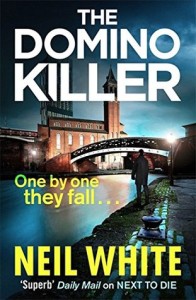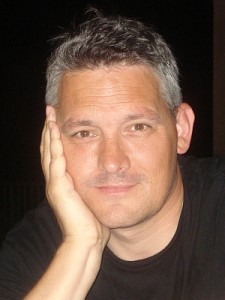Guest Post: Neil White – The Domino Killer
 Today I am delighted to welcome Neil White to the blog. Neil’s new thriller, The Domino Killer, is released on 30th July and my review appears below.
Today I am delighted to welcome Neil White to the blog. Neil’s new thriller, The Domino Killer, is released on 30th July and my review appears below.
Regular visitors to the blog may know that I like to ask my guests to discuss why they feel readers like stories about serial killers. Today I ask Neil White to step into the spotlight and share his thoughts on our serial killer fascination.
Over to Neil: Why are readers attracted to serial killers?
The answer is wider than that, because the question is really why are people attracted to serial killers. TV viewers devour factual shows that highlight the trail left behind by some maniac. Newspapers sell copies when a new mystery arises. The water cooler debates swell when there’s a new psychopath in town.
People are attracted to serial killers, so when readers turn to a book, it is no surprise that serial killer novels feature highly.
So why the attraction?
People are attracted to death. It’s why people peer over the edge of a cliff, even though they are scared of falling. They edge forward but the need to see over is compelling. But they don’t peer over the edge to see how nice the beach looks. They look to see how awful it would be to fall, to crash onto the rocks. Staring at death is life-affirming, re-assured by that quiet sigh of relief as you step back, safe again on the clifftop.
Then there’s the fascination with someone doing something they cannot comprehend doing, along with the vicarious tingle of fear.
People can understand some murders. The crime of passion, for example, or when violence goes too far when wearing the red mask of rage. But cold-blooded killings done just to satisfy an urge? Most people are not capable of that, cannot understand it, so it’s easy to be fascinated by someone who can plumb those dark depths.
Ian Brady described serial killers as the only brave ones in the world, because they are the ones who are fearless enough to give vent to their fantasies with no thought of the consequences. That’s complete nonsense, just grandiose boasting from a man who lives off scraps of infamy, but it’s an insight into his thinking, that it is all about the fantasy, about the lack of fear of the consequences, that the lack of empathy means that there is no thought for the victims. The victims are an irrelevance.
 That is so different from the usual human experience. On the whole, people empathise, couldn’t hurt someone just for the pleasure of it. There usually has to be a reason, like hiding behind a war or political cause or because their emotions got the better of them. We can understand those reasons. We cannot understand the selfishness of a serial killer, so we are fascinated by people who behave differently.
That is so different from the usual human experience. On the whole, people empathise, couldn’t hurt someone just for the pleasure of it. There usually has to be a reason, like hiding behind a war or political cause or because their emotions got the better of them. We can understand those reasons. We cannot understand the selfishness of a serial killer, so we are fascinated by people who behave differently.
There is also the second reason, that tingle of fear.
We read thrillers to be thrilled, read horror to be horrified, read scary stories to be scared. We enjoy that fear, because we know it isn’t real. It’s some distant thing, a shiver to be relished, that we have been dragged into the dark world of the killer, are brushed by that madness.
But distance is the crucial thing. Ripper walks are an industry in London, where the crowd oohs and aahs as the guide describes how women were slaughtered, running his thumb up his body to show the track of the knife at the spots where they died. I confess that, even now, when I go to London, I find myself in Spitalfields at the end of the day, enjoying a pint in the Ten Bells, where Mary Kelly spent her last night, trying to evoke the feeling of how it must have been back then, looking for the shadows of the Ripper.
Imagine how you would fare if you tried to organise such a guided tour around Leeds and Bradford, where Peter Sutcliffe murdered his victims. It would evoke rage. It would be wrong. Too close. Too recent.
So distance is crucial. It has to be a remote fear, a view from afar, because we love the tingle of fear but we like to be safe, where no one really gets hurt. Crime thrillers do that. They allow a glimpse over the cliff edge, but fundamentally it’s for the relief when the killer is caught, when the book is closed and our own lives are untouched